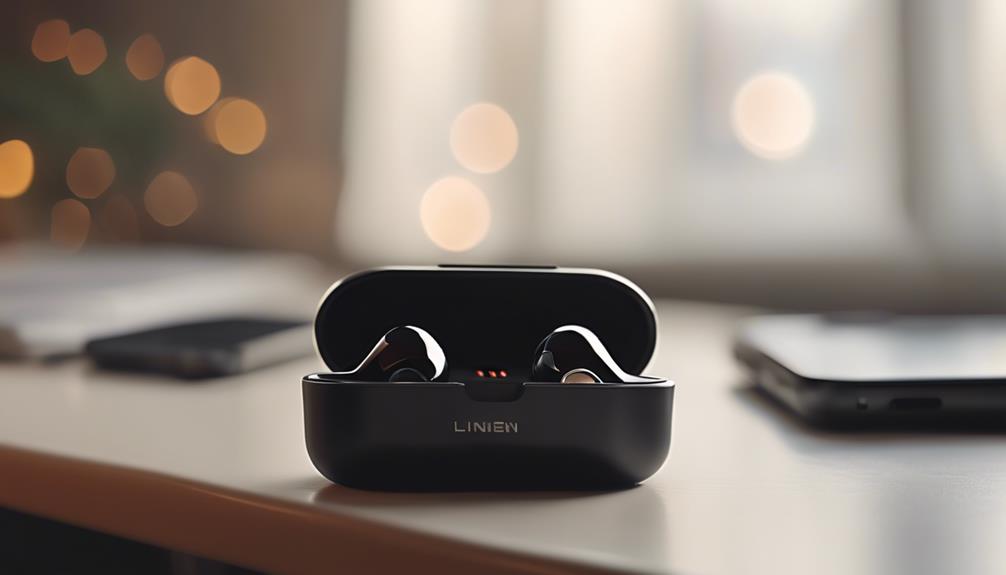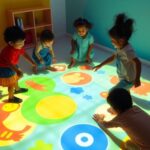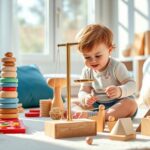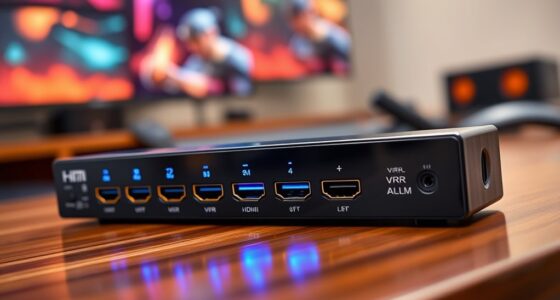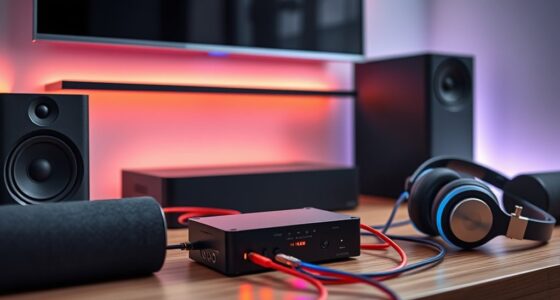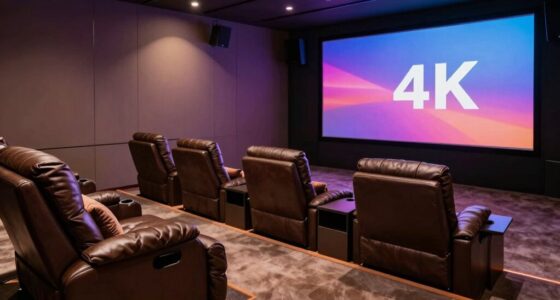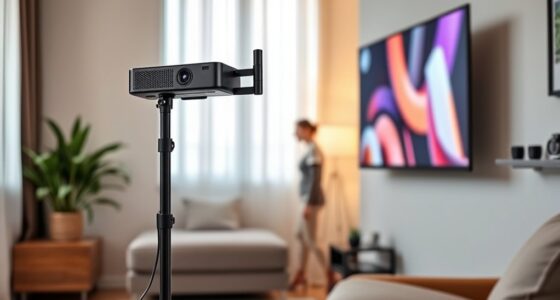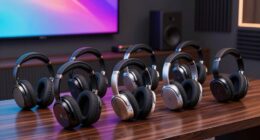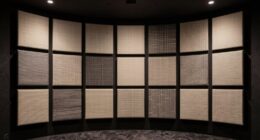I've found that music greatly enhances learning and memory in several ways. First, it boosts cognitive development, improving attention span and problem-solving skills. Second, engaging with music increases memory retention by activating brain areas linked to recall. Third, music exposure fosters language skills, enriching vocabulary and phonetic awareness. Fourth, musical activities develop motor skills, making learning more interactive. Ultimately, music sparks creative thinking and improves memory retention through participation. These benefits demonstrate how effectively music can integrate into learning processes, and exploring further can reveal even more insights into its role in education.
Key Takeaways
- Music enhances cognitive development, improving memory, attention span, and problem-solving skills in children through engaging musical activities.
- Listening to music while studying boosts memory retention by stimulating brain areas linked to recall and creating beneficial patterns.
- Musical exposure fosters language skills growth, enhancing vocabulary, phonetic awareness, and listening skills crucial for reading and writing.
- Engaging with music improves motor skills development, promoting fine and gross motor skills through interactive activities like playing instruments and dancing.

Storypod The Learning-First Audio Play System | Starter Set | Interactive Educational Toy & Storyteller | Boys & Girls | Young Kids | Toddlers & Preschoolers (The Storypod - Blue)
Screen-free Entertainment: Play and learn with storytelling adventures with the Storypod audio player. Make learning fun. Great for...
As an affiliate, we earn on qualifying purchases.
Storypod The Learning-First Audio Play System Starter Set

The Storypod Learning-First Audio Play System is perfect for parents seeking an engaging, screen-free way to boost their children's learning and memory skills through music and storytelling.
Designed for kids aged 36 months to 9 years, this award-winning system includes interactive audio features like touch-to-play yarn characters, audiobooks, and trivia cards.
I love how my child can explore stories independently by simply tapping on the Crafties or cards.
The system promotes literacy and listening skills, while also encouraging a love for storytelling.
Plus, the ability to record family voices adds a personal touch.
With its intuitive app, managing different users is easy, making it a valuable tool for fostering education and creativity in young minds.
Best For: Parents looking for an engaging, screen-free educational tool to enhance their children's storytelling and learning skills.
Pros:
- Encourages independent play and boosts literacy and listening skills through interactive audio content.
- Features the ability to record family voices, creating a personal and emotional connection.
Cons:
- Limited age range may not accommodate older children who seek more advanced content.
- Initial investment in the starter set may be considered high for some families.
Amazon Product B0D4LFTY5P
As an affiliate, we earn on qualifying purchases.
Dance Mat for Kids – Electronic Dance Game Toy

For kids aged 3 to 12, the Dance Mat for Kids – Electronic Dance Game Toy offers a fun and engaging way to boost coordination and memory through music and movement.
This mat features eight challenge levels, allowing children to progress as they improve their skills.
Measuring 35.4 by 40.2 inches, it's the perfect size for indoor or outdoor play.
With an adjustable volume, I can easily set the sound to fit our environment.
The anti-slip surface guarantees safety, preventing slips during energetic dancing.
We've found it's great for home parties and playdates, providing hours of entertainment.
Weighing just 2.01 pounds, it's easy to set up and transport.
Overall, this dance mat is a fantastic tool that combines learning with fun!
Best For: The Dance Mat for Kids – Electronic Dance Game Toy is best for children aged 3 to 12 who enjoy interactive play while developing their coordination and memory skills.
Pros:
- Engages kids with 8 levels of difficulty, promoting skill progression.
- Safe anti-slip surface ensures secure dancing and prevents accidents.
Cons:
- Requires 3 AA batteries which are not included in the package.
- Some users have commented on the perceived quality of materials.
Ditty Bird Musical Books for Toddlers | Fun Children's Nursery Rhyme Book | The Wheels On The Bus Book with Sound | Interactive Toddler Books for 1 Year Old to 3 Year Olds | Sturdy Baby Sound Books
🎶 Sound books your babies will love, perfect for potty time: Let your little ones clap, dance &...
As an affiliate, we earn on qualifying purchases.
Ditty Bird Musical Books for Toddlers

Designed specifically for toddlers aged 1-3, Ditty Bird Musical Books offer an engaging way to enhance early learning through interactive songs and vibrant illustrations.
These books feature classic children's songs, making them not just fun but also educational. The multi-sensory approach supports vocabulary expansion, language comprehension, and cognitive skills, while encouraging toddlers to sing, clap, and dance.
Their user-friendly design allows little hands to easily flip through the pages, and the durable construction guarantees they last. With replaceable batteries included, I appreciate the convenience of an on/off button.
Rated 4.6 out of 5 stars, Ditty Bird books are ideal gifts for birthdays and holidays, and they even come in various languages, making them appealing to diverse audiences.
Best For: Ditty Bird Musical Books are best for toddlers aged 1-3 who enjoy interactive learning through music and vibrant illustrations.
Pros:
- Supports multi-sensory learning, enhancing vocabulary and cognitive skills.
- Durable construction with replaceable batteries ensures longevity and convenience.
Cons:
- Some users have reported concerns about battery life.
- Limited to classic children's songs, which may not appeal to all toddlers.

ibigbean Piercing Pillow - Ear Pillow with Ear Hole - Gel Memory Foam Earring Pillow for Side Sleeping - White Cotton Pillowcase
As an affiliate, we earn on qualifying purchases.
Piercing Pillow – Gel Memory Foam Earring Pillow for Side Sleeping

As a side sleeper with ear piercings, I've found that the Piercing Pillow's gel memory foam offers the perfect blend of comfort and support, alleviating pressure on my ears while I rest.
This pillow is designed specifically for side sleepers, featuring a unique ear hole that creates a zero-pressure space for my ears.
The gel memory foam is soft, yet supportive, which enhances my overall sleep quality.
The breathable, skin-friendly cotton cover adds to the comfort, and I appreciate that it comes with a washable pillowcase.
Weighing just 1.48 pounds, it's lightweight and includes a water-resistant backpack for easy travel.
Overall, I highly recommend this pillow for anyone dealing with ear piercings or discomfort from traditional pillows.
Best For: Individuals with ear piercings or injuries who require a comfortable sleeping solution while side sleeping.
Pros:
- Provides a zero-pressure space for ears, alleviating pain and discomfort.
- Made with gel memory foam for softness and support, enhancing sleep quality.
Cons:
- The pillow's height may not be suitable for all side sleepers, potentially causing neck strain.
- Limited to users with ear piercings or specific ear injuries; may not be necessary for everyone.
Toddler Wooden Percussion Instruments Toy Set

The Toddler Wooden Percussion Instruments Toy Set is perfect for little ones aged 12 months to 3 years, fostering essential cognitive and motor skills through engaging musical play.
These instruments are made from high-quality, non-toxic materials, ensuring they're safe for kids during enthusiastic play.
With dimensions of 14 x 5 x 8 inches and weighing only 1.6 pounds, this set is lightweight and portable, making it easy to carry for home use or on the go.
Best For: Toddlers aged 12 months to 3 years who are exploring music and developing essential skills through playful learning.
Pros:
- Constructed from high-quality, non-toxic materials for child safety.
- Lightweight and portable, making it easy to use at home or while traveling.
Cons:
- Limited to younger children, which may not appeal to older kids.
- May require supervision during play to prevent misuse of small parts.
Factors to Consider When Choosing the Benefits of Music on Learning and Improving Your Memory

When I think about the benefits of music on learning and memory, there are several important factors to contemplate.
I've noticed that elements like cognitive development, emotional regulation, and memory retention play significant roles.
Understanding how these aspects interact can help me choose the right music to boost my learning experience effectively.
Cognitive Development Enhancement
Considering the powerful impact of music on cognitive development, I find it essential to explore how engaging with musical activities can greatly enhance learning and memory. Music education has shown to improve memory, attention span, and problem-solving skills in children. This leads to better academic performance, which is something every student can benefit from.
When I listen to music or play an instrument, I notice it stimulates areas in the brain related to language and reasoning. This stimulation helps with language comprehension and expands vocabulary, making it easier to understand complex subjects.
Additionally, early exposure to musical activities can enhance fine motor skills and hand-eye coordination, both vital for learning readiness. I've found that participating in music-making encourages creativity and imaginative play. These skills are fundamental for developing critical thinking and innovative problem-solving abilities.
Research also indicates that rhythm and melody can markedly aid in memory retention. This means that children can learn new information more easily and recall it later. By incorporating music into learning routines, I believe we can release a range of cognitive benefits that support overall development and academic success.
Emotional Expression and Regulation
Engaging with music not only boosts learning and memory but also greatly enhances emotional expression and regulation, allowing me to navigate my feelings more effectively.
When I listen to or create music, I find it easier to express emotions that I sometimes struggle to put into words. This is especially true when I sing or play an instrument, as these activities can help reduce anxiety and improve my mood.
Research shows that exposure to music during early childhood helps children understand emotions better. They learn to recognize feelings expressed in songs, which builds empathy.
Additionally, I've discovered that music can be a therapeutic tool, helping me process tough emotions or experiences, especially during stressful times.
Regular engagement with music has also improved my emotional resilience. I notice that I can cope with daily challenges and emotional ups and downs more effectively.
Overall, music provides me with a powerful way to express myself and manage my feelings, making it an essential part of my life.
Memory Retention Improvement
Music greatly boosts my memory retention by stimulating brain areas linked to recall and creating patterns that make information easier to remember. When I listen to music while studying, I often notice that I can remember facts and figures more easily. This happens because rhythm and melody help me form mental associations, making the information stick.
Additionally, engaging with music reduces my anxiety, which can cloud my thinking. A calm mind is essential for effective learning and memory retention. I've found that musical training, whether playing an instrument or singing, enhances my brain's ability to form new connections. This increased neuroplasticity allows me to grasp new concepts more quickly.
Incorporating music into my study routine provides a multisensory experience that reinforces what I learn. Whether it's background music or learning through song, these elements create a richer environment for memory retention.
Language Skills Growth
Through my experiences, I've found that incorporating music into learning not only boosts vocabulary growth but also enhances vital language skills. When children engage with music, they learn new words faster than those who don't. This exposure helps build a richer vocabulary, which is essential for effective communication.
Participating in musical activities like singing or playing instruments fosters phonetic awareness, a key component for reading and writing. I've noticed that these experiences improve listening skills and memory retention, making it easier to understand and recall language concepts.
In addition, music teaches rhythm and patterns, which are foundational elements in language learning. Research indicates that children involved with music often show better pronunciation and enunciation. This improvement leads to clearer speech, making it easier for them to express their thoughts.
By integrating music into learning environments, I believe we can provide a more engaging way to develop language skills. This approach not only supports academic achievements but also equips children with the tools they need for effective communication in everyday life.
Motor Skills Development
Participating in musical activities markedly enhances motor skills development in children, making learning more dynamic and interactive.
When kids engage with musical instruments, like percussion toys, they improve their fine motor skills. Grasping, striking, and manipulating these instruments fosters hand-eye coordination, which is vital for various tasks.
Moreover, music activities help develop gross motor skills as children dance and move rhythmically. This kind of movement enhances their balance and coordination, contributing to overall physical ability.
Playing music often involves repetitive motions and patterns, which can strengthen memory pathways and boost cognitive development related to motor skills.
Exposure to rhythm in music also aids in developing timing and spatial awareness, significant for physical activities and motor proficiency.
Interactive musical experiences provide children with opportunities to practice and refine these skills actively. As they participate, they build confidence in their abilities, which can encourage them to take on new challenges.
Creative Thinking Stimulation
Engaging with musical activities sparks creative thinking and enhances memory retention, opening up new pathways for innovative problem-solving.
When I participate in music, I notice that it stimulates various parts of my brain, improving my cognitive functions. This stimulation is especially crucial for creative thinking and problem-solving.
Research shows that children involved in musical activities develop better spatial-temporal skills, which are essential for creative reasoning.
I've found that music encourages me to improvise and experiment, helping me express my ideas in unique ways. This exploration fosters a creative mindset, allowing me to think outside the box.
Additionally, the rhythmic and melodic elements of music boost my memory retention. With music, I can recall information more effectively and creatively apply it in different situations.
Emotional expression is another benefit of participating in music, which can inspire originality in my thought processes.
Frequently Asked Questions
Can Music Improve Concentration During Studying or Working?
I've found that music can really help me concentrate when I study or work. It creates a background noise that drowns out distractions and keeps me focused on the task at hand. It's become essential for me.
What Genres of Music Are Best for Learning?
I believe classical music serves as a gentle river, flowing through my thoughts, while ambient sounds create a serene landscape. For studying, I find instrumental genres, like chillhop or lo-fi, truly enhance my focus and creativity.
How Does Music Therapy Aid Memory Retention?
Music therapy aids my memory retention by creating emotional connections with information. It's soothing and helps me focus, making it easier to recall details later. I've noticed significant improvements in my learning and recall abilities.
Does Listening to Music While Reading Affect Comprehension?
As I plunge into a sea of words, I've found that listening to music while reading can be like steering through a storm. It often distracts me, making comprehension harder to grasp amidst the waves of sound.
Can Playing an Instrument Enhance Cognitive Skills?
I believe playing an instrument definitely enhances cognitive skills. When I practice, I notice improved focus and problem-solving abilities. It keeps my brain active, fostering creativity and discipline, which positively impacts other areas of my life.
Conclusion
In summary, incorporating music into learning is like adding fuel to a fire—it can greatly enhance memory and comprehension.
From interactive toys to musical books, there are numerous resources available to support this approach.
By choosing the right tools and understanding how music impacts our brains, we can create an engaging learning environment.
Embracing these benefits allows us to release potential and improve retention, making education more effective and enjoyable for everyone involved.

